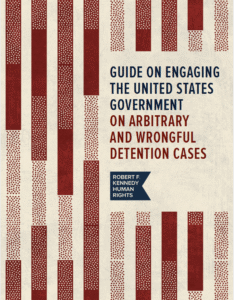WASHINGTON, December 12, 2017 — Today at the National Press Club in Washington, DC, Robert F. Kennedy Human Rights, along with partners from the International Bar Association and numerous other non-governmental organizations, launched a new report, entitled Inquiry on Crimes Against Humanity in North Korean Political Prisons. After an extensive examination of evidence, the Report authors conclude that Kim Jong-un and other regime officials in North Korea should be prosecuted for ten of the 11 Crimes Against Humanity enumerated in the Rome Statute, the treaty establishing the International Criminal Court.
The Report was authored by internationally renowned judges Navanethem “Navi” Pillay, Thomas Buergenthal, and Mark B. Harmon. Collectively, these three jurists have served at the International Criminal Court, the International Criminal Tribunal for Rwanda, the International Criminal Tribunal for the former Yugoslavia, the International Court of Justice, the Inter-American Court of Human Rights, and the Extraordinary Chambers in the Courts of Cambodia. After an exhaustive examination of evidence, the authors call on the international community to vest in the International Criminal Court or a special international tribunal the power to investigate Crimes Against Humanity committed in North Korea’s political prisons, and to hold culpable parties accountable for their crimes, including Supreme Leader Kim Jong-un, members of the Workers’ Party of Korea and its Politburo, internal security officials, and prison guards. The authors also call on North Korea to dismantle its gulag system and release the estimated 80,000–130,000 political prisoners.
The Report was developed using a novel approach, designed to mirror the rigor and credibility of international criminal accountability mechanisms that have existed to date. During a daylong hearing held in Washington, DC in 2016, Chief Judge Navi Pillay and her fellow judges heard in-person testimony from North Korean defectors, including a former North Korean political prison guard and prison camp survivors. These witnesses, who testified as substantial personal risk, provided graphic and disturbing accounts of atrocities they witnessed or were subjected to in the political prisons.
Alongside personal testimonies, the hearing drew on other sources of evidence, including scholarly works, videos, transcripts, testimony provided to the 2014 United Nations Commission Of Inquiry, satellite imagery, and the live testimony of two leading experts on North Korea’s network of political prisons and its political system, David Hawk and Kenneth Gause. These and other experts have written about North Korea’s longstanding policy of imprisoning the children, spouse, parents and other family members of a political prisoner in order to eliminate the “seed” of three generations of “class enemies.”
Following the hearing in December 2016, the Report authors received a new and detailed affidavit from Mr. Thae Yong-ho, North Korea’s former Deputy Ambassador to the United Kingdom and its highest-ranking defector in recent years. Mr. Thae’s detailed affidavit provided damning testimony about Kim Jong-un and regime officials, and their level of involvement in committing grave human rights abuses.
The authors, with extensive assistance from lawyers at the international law firm of Hogan Lovells, then applied established legal doctrine to the evidence, including the principle of “command responsibility,” in which superiors are held responsible for the criminal acts of their subordinates. After a lengthy legal analysis, the Report concludes that Kim Jong-un and other regime officials should be prosecuted for ten of the 11 crimes against humanity enumerated in the Rome Statute, including crimes committed by subordinates such as prison guards. The ten crimes are: murder, extermination, enslavement, forcible transfer, imprisonment, torture, sexual violence, persecution, enforced disappearances and other inhumane acts.
The methodology of the Report therefore follows as closely as possible what accountability for Crimes Against Humanity in North Korea’s political prisons could look like. The Judges who authored the Report have all served on courts and tribunals designed to examine cases of international crimes; the lawyers who presented evidence at the hearing have tried cases involving international crimes; the witnesses and experts who testified were exactly the people who would be called on to inform such a court. The conclusions of the Report are very likely the same conclusions that an accountability mechanism, empowered to examine whether Crimes Against Humanity are taking place in North Korean prison camps, would find.
Among the nine recommendations made by Judges Pillay, Buergenthal and Harmon in the new report are:
- the dismantlement of the DPRK political prison system and commitment to a new system of fair and transparent justice that affords proper due process to its citizens and acceptance of an international monitoring scheme that ensures the present political prison system remains dismantled;
- the implementation of safeguards by UN member states to prevent the importation of products produced in the North Korean penal system; and
- the adoption of carefully targeted, coordinated and multilateral sanctions against individuals deemed responsible for past or ongoing crimes against humanity in the DPRK.
After reviewing the evidence, Judge Buergenthal, who was a child survivor of Auschwitz and Sachsenhausen, told the Washington Post, “I believe that the conditions in the [North] Korean prison camps are as terrible, or even worse, than those I saw and experienced in my youth in these Nazi camps and in my long professional career in the human rights field.”




